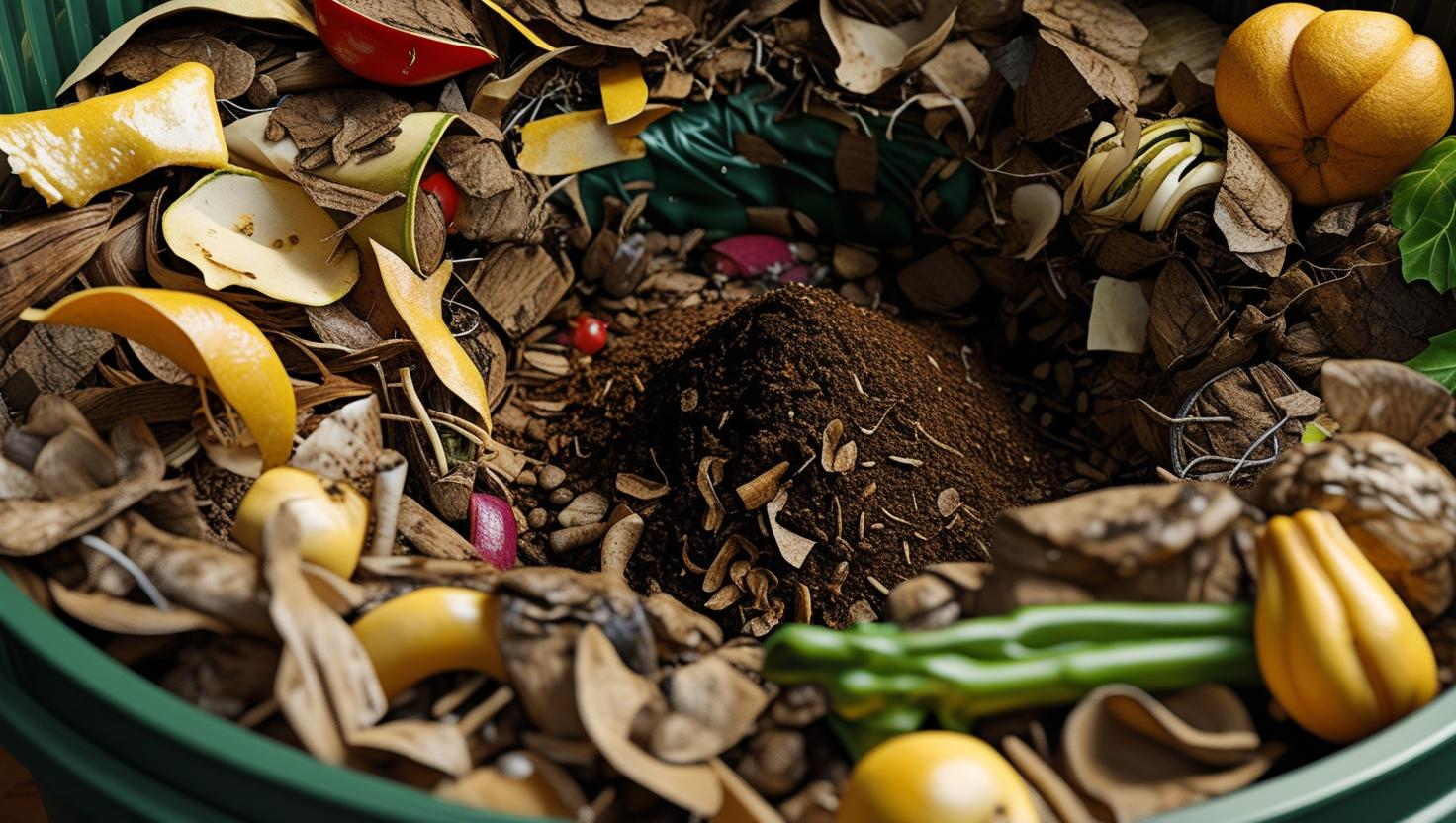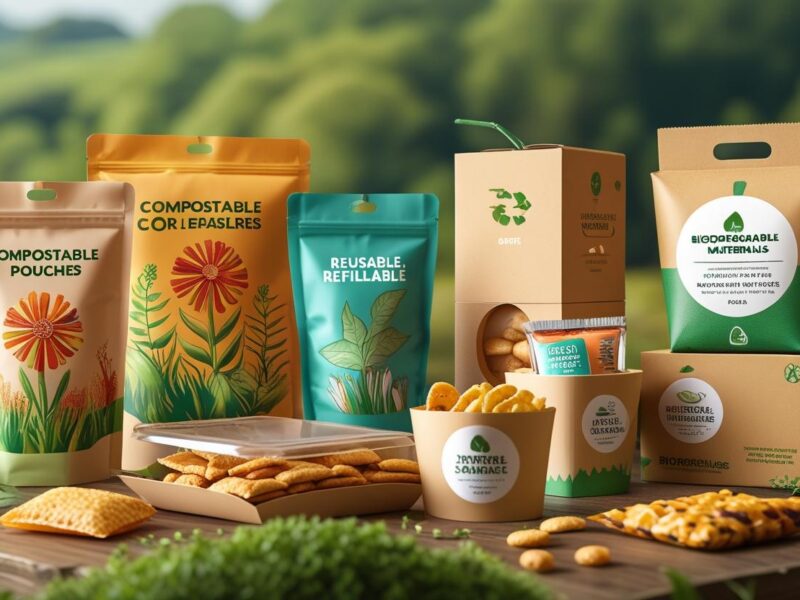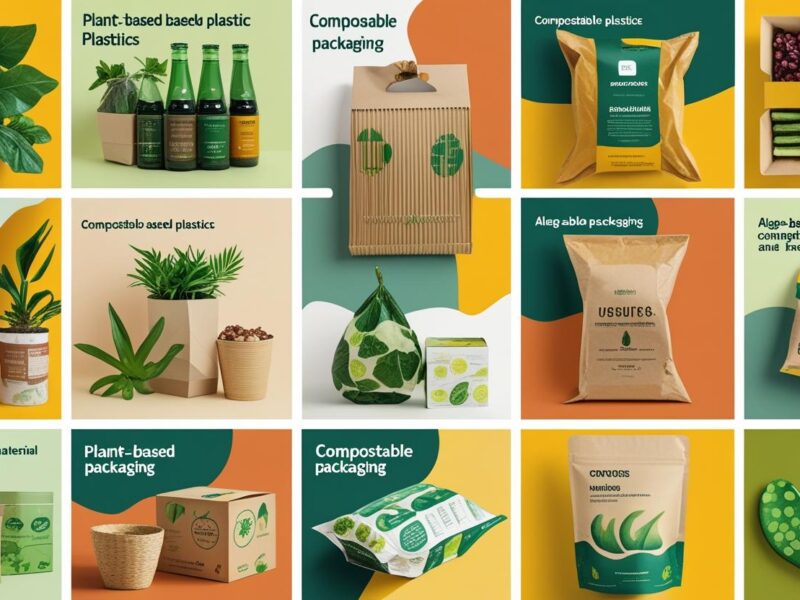Learn how to turn your kitchen waste into valuable compost. This guide will teach you the best methods for composting at home.
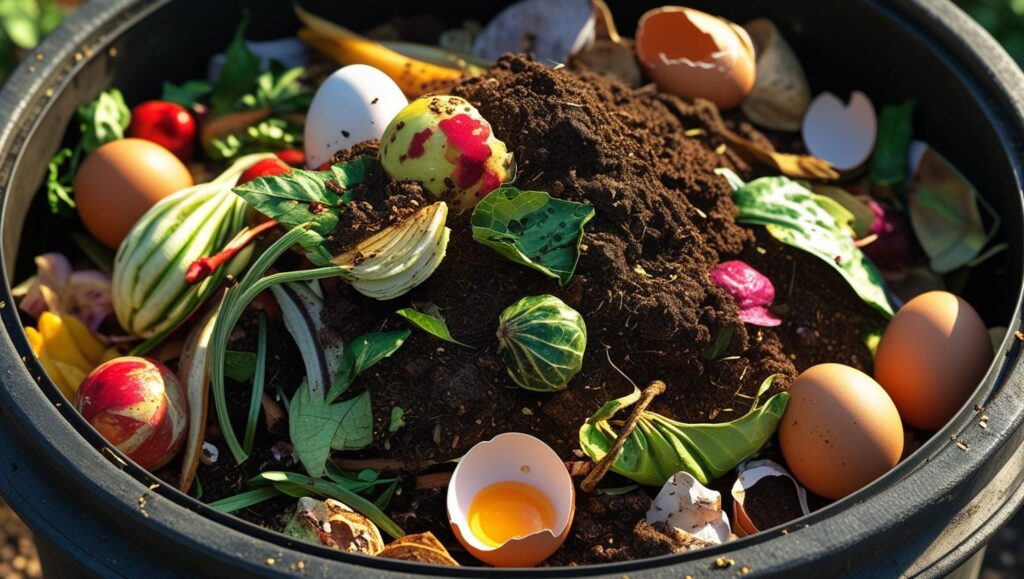
Why Composting Kitchen Waste is a Game-Changer
In today’s world, where environmental concerns are growing and sustainability is at the forefront, composting has become a crucial practice. What better way to contribute to a cleaner planet than by transforming your kitchen waste into nutrient-rich compost for your garden? This simple act not only helps reduce waste in landfills but also nurtures your plants and improves the health of your soil. If you’ve ever wondered how you can make compost from kitchen waste, you’re in the right place.
In this comprehensive guide, we will walk you through everything you need to know about composting at home—from what materials are suitable for composting, to the best techniques for making compost, and how you can use your homemade compost to enhance your garden. Let’s get started!
What Is Composting?
Composting is the process of turning organic waste into nutrient-rich material that can be used to fertilize soil. Essentially, it involves decomposing organic matter, such as food scraps, leaves, and yard waste, into humus—a dark, earthy substance that enhances soil structure and promotes healthy plant growth.
When you compost kitchen waste, microorganisms, worms, and other decomposers break down the materials into compost. This process is completely natural and happens in the presence of air, water, and warmth, transforming waste that would otherwise end up in landfills into a valuable resource.
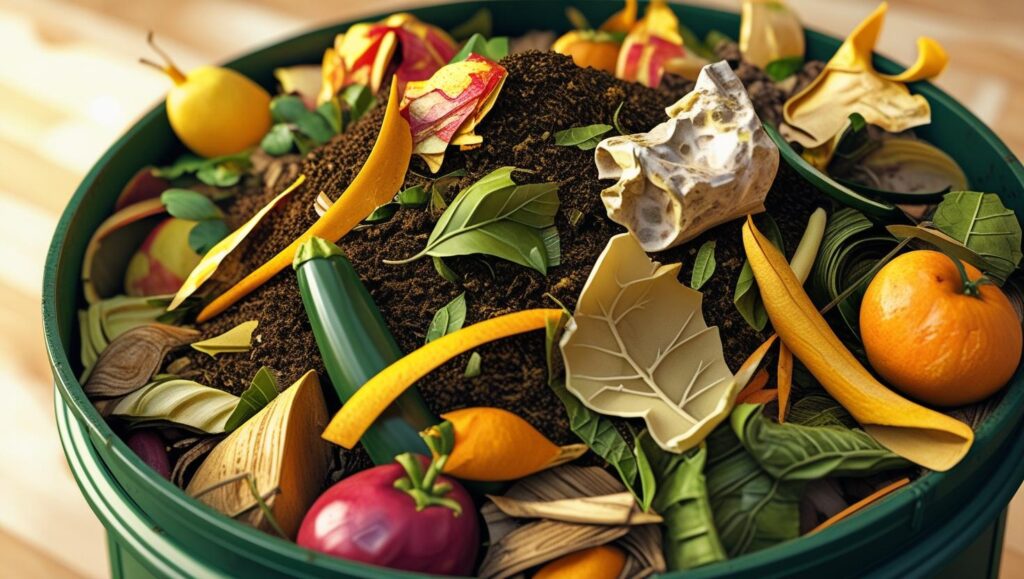
The Benefits of Composting Kitchen Waste
Environmental Benefits
The most obvious advantage of composting kitchen waste is its positive impact on the environment. Food waste accounts for a significant percentage of the waste that ends up in landfills. By composting kitchen scraps, you reduce the amount of organic waste sent to landfills and contribute to reducing methane emissions. Methane is a potent greenhouse gas, and by composting, you help keep it from entering the atmosphere.
Additionally, composting reduces the need for chemical fertilizers, which can harm the environment. By creating compost at home, you’re supporting sustainable farming practices and reducing your ecological footprint.
Health Benefits
Composting kitchen waste also offers health benefits. When you make your compost, you create a fertile, healthy environment for your plants to grow. Plants that are nourished by rich compost tend to be stronger, healthier, and more resistant to diseases and pests. This means your vegetables, fruits, and flowers will thrive without the need for synthetic pesticides or fertilizers.
Economic Benefits
Composting can save you money. Instead of buying expensive commercial fertilizers, you can use the compost you’ve made at home to feed your plants. Additionally, by reducing the amount of food waste that ends up in the trash, you’ll also lower your overall waste disposal costs. Plus, making compost at home is a free and easy way to recycle your kitchen scraps.
Types of Kitchen Waste Suitable for Composting
Not all kitchen waste can be composted. It’s important to know what types of organic waste will decompose properly and contribute to your compost pile’s health.
Fruit and Vegetable Scraps
Fruit and vegetable scraps are some of the best materials for composting. Peels, cores, stems, and any other leftover parts of produce are packed with nutrients that your compost heap will love. The only exceptions are citrus peels, which, if added in excess, can make the compost too acidic.
Coffee Grounds and Tea Bags
Both coffee grounds and tea bags are excellent additions to your compost. They are rich in nitrogen, an essential nutrient for decomposers in your compost. Just make sure to remove the paper tag from the tea bags before tossing them in.
Eggshells and Dairy Products
Eggshells are a great source of calcium and will help break down other materials in the compost pile. Dairy products, however, should generally be avoided as they can attract pests.
Leftovers and More
Food scraps like rice, pasta, and bread are compostable, though in small quantities. Avoid putting in anything with too much fat, meat, or processed foods, as they can be difficult to break down and attract rodents.
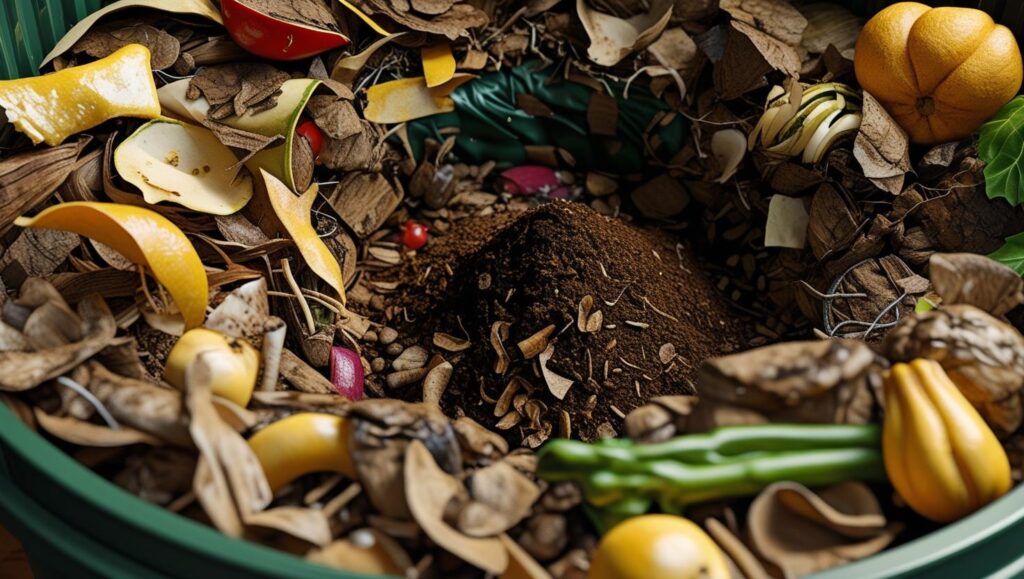
How to Start Composting with Kitchen Waste
Step-by-Step Guide to Composting
Starting a composting system in your kitchen or garden is easier than you think. Here’s a simple, step-by-step guide to get you started:
- Choose a Compost Bin: You can use a simple plastic container, a wooden compost bin, or a specialized compost tumbler. Ensure it has proper ventilation to allow for airflow, which helps the decomposition process.
- Create Layers: Start by adding a layer of brown materials like dried leaves or cardboard. Follow this with a layer of green materials (your kitchen waste). Alternate between green and brown layers to maintain the right balance of carbon and nitrogen.
- Maintain the Pile: Turn the compost regularly with a pitchfork or compost turner to aerate it. This helps to speed up the decomposition process and prevents odor build-up.
- Keep it Moist: Your compost pile should be damp but not soaking wet. If it’s too dry, add water; if it’s too wet, add more brown materials like dry leaves.
Choosing the Right Compost Bin
The right bin will depend on the space you have available and your composting needs. If you’re composting in a small apartment, a compact indoor compost bin or worm bin (vermicomposting) might be a good option. For larger outdoor composting, a compost tumbler or a bin made from wood or recycled plastic works well.
Properly Balancing Green and Brown Materials
A healthy compost pile needs the right mix of green (nitrogen-rich) and brown (carbon-rich) materials. A general rule is to use about three parts brown materials to one part green materials. Brown materials include things like dry leaves, straw, and cardboard, while green materials are your kitchen scraps, grass clippings, and coffee grounds.
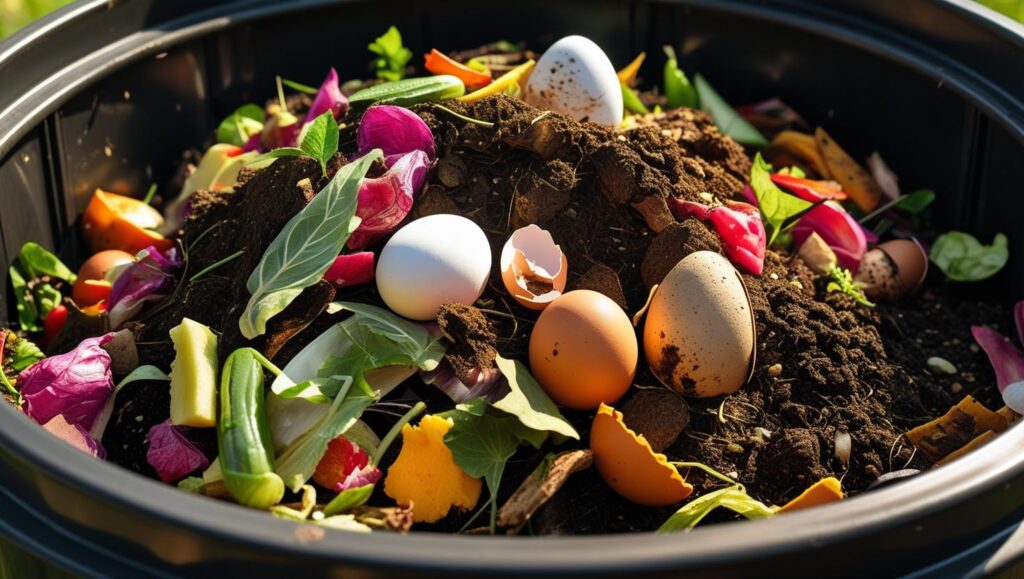
Common Mistakes to Avoid When Composting Kitchen Waste
- Adding Too Much Wet Waste: Too many wet or slimy scraps (like salad greens) can make your compost pile too soggy, leading to bad odors and slow decomposition.
- Not Turning the Pile: If you neglect to turn your compost pile regularly, it can become compacted, preventing airflow and slowing down decomposition.
- Using the Wrong Materials: Avoid composting meat, bones, dairy, or oily foods, as these can attract pests and create unpleasant odors.
How Long Does It Take to Make Compost from Kitchen Waste?
The time it takes for your kitchen waste to turn into compost depends on several factors, such as the type of materials you’re using, the moisture level, and the temperature of the compost pile. Generally, it takes between 3 to 6 months for compost to be ready. Turning the compost regularly and maintaining the right moisture levels can speed up the process.
Using Finished Compost in Your Garden
Fertilizing Your Garden
Finished compost can be used to fertilize your garden, providing plants with the nutrients they need to grow. Spread it around the base of plants or mix it into your garden soil for the best results.
Improving Soil Health
Compost is not just a fertilizer; it also improves soil structure. It helps soil retain moisture, improves aeration, and provides a habitat for beneficial microorganisms. Composting is a long-term investment in the health and vitality of your garden.
Frequently Asked Questions
Q1: Can I compost all my kitchen waste?
Not all kitchen waste is compostable. Avoid meat, bones, dairy, and oily foods. Stick to fruit and vegetable scraps, coffee grounds, eggshells, and other organic materials.
Q2: Do I need to buy a compost bin?
You don’t need to buy a compost bin, but it helps. You can create your compost pile in a corner of your yard or use an old container. A bin helps contain the compost and manage it more efficiently.
Q3: How do I know when my compost is ready?
Finished compost is dark, crumbly, and has an earthy smell. It should look like rich, dark soil. If you can still recognize bits of the original material, it needs more time to decompose.
Q4: How often should I turn my compost pile?
Turning your compost pile every 2-3 weeks helps to aerate it and speed up the decomposition process.
Q5: Can composting attract pests?
If you compost correctly and avoid adding meat or dairy, pests shouldn’t be an issue. If pests do appear, consider using a closed compost bin or covering the pile with a layer of brown materials.
Embrace Composting for a Sustainable Future
Composting kitchen waste is a simple, effective way to reduce your carbon footprint, enrich your garden, and contribute to a more sustainable lifestyle. By following the tips in this guide, you’ll be on your way to creating nutrient-rich compost that will nourish your plants and soil while minimizing waste. Start small, and soon enough, you’ll be reaping the rewards of your composting efforts!
